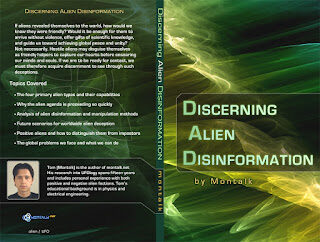This series, beginning at part 1, part 2, part 3, part 4 and part 5, is a consideration of the book Discerning Alien Disinformation written by Montalk. We will consider alien types and whether there are positive and negative ones. Montalk is not a Christian and is very insightful. There are areas of agreement as well as disagreement.
In a section titled, Avenues of Disinformation, Montalk writes:
“Channeling involves one or more individuals allowing themselves to be used by unseen intelligences who communicate information through them. This includes the use of Ouija boards, mediumistic trance states, automatic writing, and conscious verbalization of intuitive impressions.
Pendulum dowsing, muscle testing, scrying, and crystal gazing may also allow such communication. The channeled sources may claim to be anything ranging from aliens to angels, deceased persons to demonic beings, famous individuals in history, time travelers, other dimensional entities, the subconscious, and impersonal archetypes.”
As we pointed out in the article Likenesses between spirit channeler mediums and alien contactees/experiencers we noted that upon which we will touch again in this context which is that in order to allow aliens, ascended masters, spirit guides, etc., demons by any other name to interact directly, intimately, come into us, etc., possession by any other name; we must allow them access, must invite them, must accept them, must be open to them.
Thus, in channeling one must allow themselves to be used by unseen intelligences. Montalk states that some proponents of alien interaction state:
“Abductees should more accurately be called experiencers, communicators, interfaces, guests or contactees, because they have been invited to meet with aliens and have given permission. Abductees are not victims, but co-creators and equal participants.”
So here is the litigious language again, the terminology of agreement as they have given permission.
Montalk attempts to draw a distinction:
“genuine cases of benevolent alien contact, which are less common than alien abductions where permission is coerced or circumvented.”
Thus:
“Aliens cannot interact with us, or perceive us, if we do not first give them permission at some level.”
One last quote on this subject from the book as he refers to some Shared Traits of positive and negative aliens:
“Either may respect freewill, stepping in only when asked. The difference is that positive aliens respect it fully and demand it be an informed and sincere choice, while negative aliens only respect freewill as something to covertly manipulate into granting them permission and legalizing their subsequent takeover. Both might ask us for permission before opening full contact.”
Yet, even with this attempt to dichotomize between positive and negative aliens keep in mind that he writes:
“higher positive beings…are not perfect by any means…prone they are to acting on incomplete information, making naive assumptions, and misplacing their trust…If we have invited them, it is only because we were unaware of what that entailed, and after becoming aware we would have every reason to revoke the invitation.”
Within the realm of alien contact studies there is also the concept of soul level agreements which Montalk explains thusly:
“‘when the voluntary agreement was made before incarnating’ and can be ‘forgotten’ which ‘negative alien groups could exploit.’”
So, on that non-, un- and anti-biblical view in a pre-birth state you can make a decision to interact with aliens in the upcoming lifetime but can forget that you made that deal, the agreement, and thus you are tormented by the experiences rather than embracing them outright.
In attempting, as he does, to dichotomize positive and negative aliens, Montalk states:
“positive forces who respect freewill would intervene only if requested. On the other hand, negative forces who desire a fully legalized takeover would also require our consent.
The difference comes down to how heavily we are pushed into giving that consent. If the faction is one that fundamentally respects freewill, then it would calmly let us make up our own mind. If the faction is less benevolent, then it would be more desperate. The underlying intention is what counts….
the process is gradual and starts with getting a foot in the door. With manipulative aliens, it is by leveraging what intrusions they can make that they can make deeper intrusions.” (emphasis added)
The litigious nature of such interactions is found within alien lore, demonology and even in vampire tales such that they cannot enter a home without being invited in or the more modern concept of black eyed children who are quoted as saying things like, “Can I come in?” Lastly, Montalk specifically noted that the “message Do
You Wish That We Show Up? [was] disseminated on the internet in 2003.”

